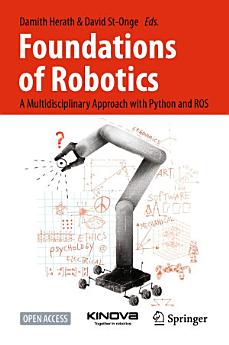Foundations of Robotics: A Multidisciplinary Approach with Python and ROS
ഈ ഇ-ബുക്കിനെക്കുറിച്ച്
“This book provides the ‘foundation’ for understanding how robots work. It is the accessible introduction that artists and engineers have been waiting for.”
- Ken Goldberg, William S. Floyd Jr. Distinguished Chair in Engineering, UC Berkeley.
റേറ്റിംഗുകളും റിവ്യൂകളും
രചയിതാവിനെ കുറിച്ച്
Damith Herath (Ph.D., Robotics) is an Associate Professor in Robotics and Art at the University of Canberra. Damith is a multi-award winning entrepreneur and a roboticist with extensive experience leading multidisciplinary research teams on complex robotic integration, industrial and research projects for over two decades. He founded Australia’s first collaborative robotics startup in 2011 and was named one of the most innovative young tech companies in Australia in 2014. Teams he led in 2015 and 2016 consecutively became finalists and, in 2016, a top-ten category winner in the coveted Amazon Robotics Challenge - an industry-focussed competition amongst the robotics research elite. In addition, Damith has chaired several international workshops on Robots and Art and is the lead editor of the book "Robots and Art: Exploring an Unlikely Symbiosis" - the first significant work to feature leading roboticists and artists together in the field of Robotic Art.
David St-Onge (Ph.D., Mech. Eng.) is an Associate Professor in the Mechanical Engineering Department at the École de technologie supérieure and director of the INIT Robots Lab (initrobots.ca). David’s research focuses on human-swarm collaboration more specifically with respect to operators’ cognitive load and motion-based interactions. He has over 10 years’ experience in the field of interactive media (structure, automatization and sensing) as workshop production director and as R&D engineer. He is an active member of national clusters centered on human-robot interaction (REPARTI) and art-science collaborations (Hexagram). He participates in national training programs for highly qualified personnel for drone services (UTILI), as well as for the deployment of industrial cobots (CoRoM). He led the team effort to present the first large-scale symbiotic integration of robotic art at the IEEE International Conference on Robotics and Automation (ICRA 2019).




